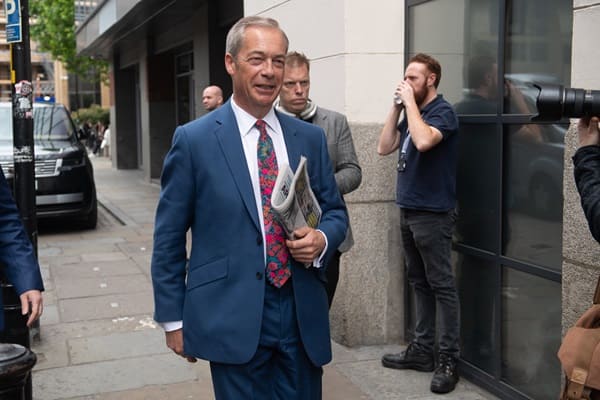Nigel Farage, the Reform Party leader, is, this time, absolutely right: the UK urgently needs a sovereign Bitcoin reserve fund.
|
<!–
–> |
While Farage pitches Reform UK’s crypto plan to global Bitcoiners in Las Vegas, critics at home are quick to dismiss it as political grandstanding.
But here’s the hard truth: with President Donald Trump announcing the creation of a Strategic Bitcoin Reserve in the United States, and pledging to make America “the crypto capital of the world,” the geopolitical stakes have changed.
The UK must act decisively, or risk being sidelined in the most important monetary transition of the century.
Whatever your opinion about him on other issues, Nigel Farage’s proposal for a Bitcoin reserve isn’t fringe, it’s foresight.
The global financial system is being re-architected in real time. A sovereign Bitcoin reserve fund is becoming a strategic imperative.
Farage’s plan includes slashing capital gains tax on crypto from 24% to 10%, enabling tax payments in digital assets, and anchoring a new sovereign reserve in Bitcoin. These aren’t radical ideas; they’re pragmatic steps in a world where digital assets are fast becoming monetary infrastructure, and the UK is playing catch-up.
What’s more troubling is that Sir Keir Starmer’s Labour government has yet to take the initiative. The silence from the Treasury is deafening. The failure to even consider integrating Bitcoin into national reserves is a major missed opportunity. Labour is presenting itself as a future-facing government, but it’s currently refusing to engage with one of the most important monetary innovations of our time.
According to HMRC’s own data, 20% of UK adults aged 18–34 already hold or trade crypto. That’s not a fringe minority, it’s an entire economic generation. Pretending this demographic doesn’t exist won’t work. They want their state to understand digital value, and to reflect it in policy.
It’s not just younger generations either. A 2024 report found that over a third of all UK crypto holders are using digital assets for long-term investment, with increasing numbers citing inflation concerns and distrust of fiat systems.
Institutional interest is also soaring. The Bitcoin ETF from BlackRock (the $9 trillion asset manager), for instance, has broken multiple inflow records in 2025 alone.
Against this backdrop, Trump’s endorsement of a US Strategic Bitcoin Reserve is a signal to global markets. When the world’s largest economy starts accumulating digital reserves, it forces other states to consider the strategic cost of sitting still. If the Bank of England fails to even explore this, it will be a historic mistake. Bitcoin is no longer speculative, it’s already structural. Ignoring its role in sovereign reserves is like ignoring the internet in the 1990s.
To be clear, a sovereign Bitcoin reserve doesn’t mean adopting crypto in place of the pound. It means adding a digital, decentralised layer of resilience to national reserves—much like gold. In fact, Bitcoin’s fixed supply, transparent issuance, and independence from central bank manipulation make it arguably a superior modern hedge.
Farage’s framing may be populist, but the idea stands on solid macroeconomic ground. With sterling vulnerable to political churn and debt pressures, a Bitcoin reserve could offer long-term value stability—and international signalling power. It would tell investors that the UK is open to innovation, serious about currency diversification, and not afraidto lead.
Meanwhile, critics are stuck asking the wrong question—whether crypto is “real money.” Markets have already answered that. What matters now is: which states will integrate this reality into national policy? We’re seeing a digital financial arms race emerge. El Salvador’s pioneering Bitcoin treasury, the UAE’s crypto-forward stance, Switzerland’s integration of digital assets into banking—these are no longer edge cases. They are part of a growing mosaic of nation-states adapting to the new monetary era.
The UK must decide whether it wants to be a digital finance leader or a laggard. Farage, however unexpectedly, is pointing in the right direction. We need policy built for the economy we’re heading into, not the one we’re leaving behind. A sovereign Bitcoin reserve fund isn’t just smart economics—it’s a statement of national ambition. The clock is ticking. The US has made its move. If Britain wants to remain relevant in tomorrow’s financial world, it must respond with vision.
Get real time update about this post category directly on your device, subscribe now.




